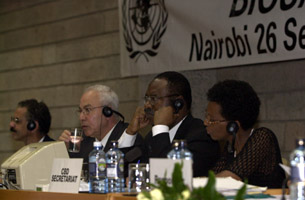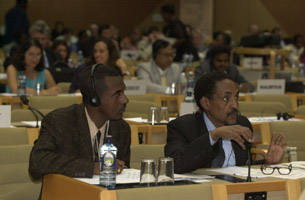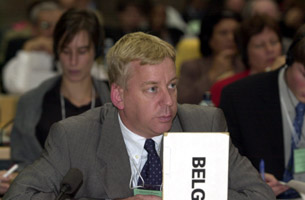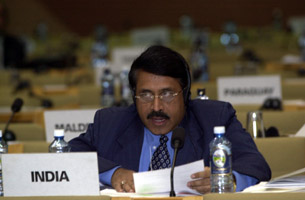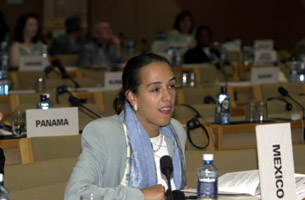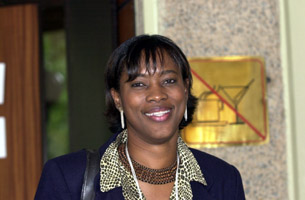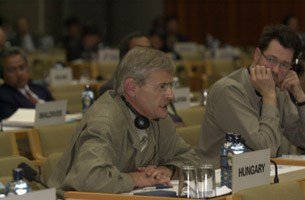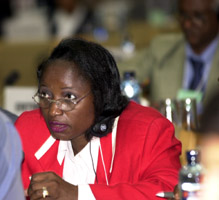|
Delegates
expressed their satisfaction with progress made during the meeting,
while noting its predominant focus on process over substance. The
meeting highlighted continued concerns regarding capacity building and
information sharing as essential elements for the Protocol's
ratification and implementation at the national level. Discussions on
the documentation of living modified organisms for food, feed or
processing (LMO-FFPs), liability and redress, and compliance
underscored tensions dating back to the Protocol's negotiations,
while focusing on the exact nature of future processes to address
them.
ICCP-2
developed recommendations on its agenda items, which will be forwarded
to MOP-1 for consideration. In the event that the Protocol does not
enter into force by 8 January 2002, ICCP-2 proposed that a third
Intergovernmental Committee meeting be convened to maintain momentum
on preparations for the Protocol's effective implementation at the
time of its entry into force.
|
|
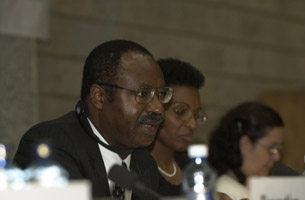 Chair
Yang (left) opened the closing Plenary and introduced discussion on
the Secretariat, rules of procedure, MOP-1's draft provisional
agenda and a new recommendation under discussion of other matters on
cooperation with the IPPC, which were adopted after some discussion.
(See relevant sections above for substantive comments.) Chair
Yang (left) opened the closing Plenary and introduced discussion on
the Secretariat, rules of procedure, MOP-1's draft provisional
agenda and a new recommendation under discussion of other matters on
cooperation with the IPPC, which were adopted after some discussion.
(See relevant sections above for substantive comments.)
 Real Audio
of Ambassador Yang's closing plenary address
Real Audio
of Ambassador Yang's closing plenary address
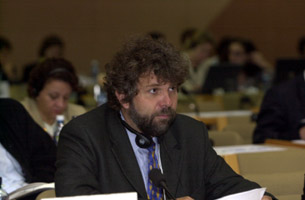 Chair Pythoud
(left) introduced the report of WG-I, UNEP/CBD/ICCP/2/L.13 and L.13/Corr.1
and its recommendations, noting that they contain bracketed text. The
US requested that his reservations be reflected along with
Australia's regarding a paragraph on the recommendation for
handling, packaging, transport and identification. Brazil requested
her support be added to Argentina's statement in the report on a
paragraph noting the need for financial assistance in implementing
Articles 18.2(b) and (c). Chair Yang preferred that the reservations
and bracketed text in these recommendations stand to reflect areas of
difficulty, and the WG-I report and its recommendations were adopted. Chair Pythoud
(left) introduced the report of WG-I, UNEP/CBD/ICCP/2/L.13 and L.13/Corr.1
and its recommendations, noting that they contain bracketed text. The
US requested that his reservations be reflected along with
Australia's regarding a paragraph on the recommendation for
handling, packaging, transport and identification. Brazil requested
her support be added to Argentina's statement in the report on a
paragraph noting the need for financial assistance in implementing
Articles 18.2(b) and (c). Chair Yang preferred that the reservations
and bracketed text in these recommendations stand to reflect areas of
difficulty, and the WG-I report and its recommendations were adopted.
 to follow
to follow
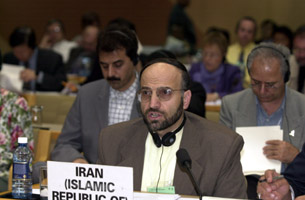 Chair
Salamat (right) introduced the report of WG-II (UNEP/CBD/ICCP/2/L.14)
and it's recommendations. He noted some editorial changes and
inclusion of a footnote in the recommendation on compliance, stating
that dates may be extended or altered by the Executive Secretary if
the MOP does not occur in April 2002. After discussion clarifying that
experts' meeting reports annexed to the recommendations were not
considered as negotiated or adopted texts, the report and
recommendations of WG-II were adopted. Chair
Salamat (right) introduced the report of WG-II (UNEP/CBD/ICCP/2/L.14)
and it's recommendations. He noted some editorial changes and
inclusion of a footnote in the recommendation on compliance, stating
that dates may be extended or altered by the Executive Secretary if
the MOP does not occur in April 2002. After discussion clarifying that
experts' meeting reports annexed to the recommendations were not
considered as negotiated or adopted texts, the report and
recommendations of WG-II were adopted.
 to follow
to follow
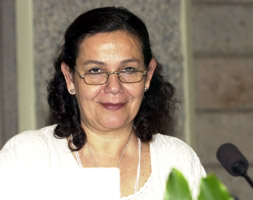
Rapporteur Gutiérrez Rosati
presented ICCP-2's draft report (UNEP/CBD/ICCP/2/L.1), which was
adopted with several editorial modifications. The Plenary then
discussed recommendations on preparatory work for MOP-1, which was
adopted after some discussion (see relevant section above).
Chair
Yang then noted ICCP-2's continuation of the "Montreal Spirit"
and noted that the ICCP-2's results show that all countries are
committed to the Protocol's early entry into force and effective
implementation. He highlighted upcoming consultations between the
Bureaus of the ICCP and COP-6, and expressed his gratitude to the
Netherlands hosting ICCP-3 or MOP-1 in conjunction with CBD COP-6 in
April 2002. Chair Yang thanked the participants, Working Group and
contact group chairs, ICCP Bureau, CBD Secretariat, UNEP, UNON
conference services, translators and government and people of Kenya.
 Ethiopia
on behalf of the G-77/China, Belgium on behalf of the European
Community and its Member States, India on behalf of the Asian
Group,
Mexico on behalf of GRULAC, Jamaica on behalf of AOSIS,
Hungary on
behalf of the CEE, and Cameroon on behalf African Group also expressed
their thanks and best wishes (above photos). Australia requested that the Bureau, in
its consideration of an agenda for ICCP-3, focus on priority issues
within the ICCP's mandate, particularly requirements in the first
sentence of Article 18.2(a) on "may contain," BCH, capacity
building and budgetary matters. Kenya thanked participants for
choosing Nairobi, Kenya as the meeting's site. Morocco noted ties
between climate change and biodiversity and its role as host of the
upcoming COP-7 of the UN Framework Convention on Climate Change.
Ethiopia
on behalf of the G-77/China, Belgium on behalf of the European
Community and its Member States, India on behalf of the Asian
Group,
Mexico on behalf of GRULAC, Jamaica on behalf of AOSIS,
Hungary on
behalf of the CEE, and Cameroon on behalf African Group also expressed
their thanks and best wishes (above photos). Australia requested that the Bureau, in
its consideration of an agenda for ICCP-3, focus on priority issues
within the ICCP's mandate, particularly requirements in the first
sentence of Article 18.2(a) on "may contain," BCH, capacity
building and budgetary matters. Kenya thanked participants for
choosing Nairobi, Kenya as the meeting's site. Morocco noted ties
between climate change and biodiversity and its role as host of the
upcoming COP-7 of the UN Framework Convention on Climate Change.
 A
statement on behalf of a number of NGOs, inter alia:
congratulated the six countries that have ratified the Protocol;
called for a ban on LMOs in centers of origin and diversity; and
supported interim measures and a fund on liability and redress.
Hamdallah Zedan, CBD Executive Secretary stressed that countries
ratifying the Protocol need to represent the diversity of the global
community, including developing and developed and importing and
exporting countries. A
statement on behalf of a number of NGOs, inter alia:
congratulated the six countries that have ratified the Protocol;
called for a ban on LMOs in centers of origin and diversity; and
supported interim measures and a fund on liability and redress.
Hamdallah Zedan, CBD Executive Secretary stressed that countries
ratifying the Protocol need to represent the diversity of the global
community, including developing and developed and importing and
exporting countries.
 Real Audio
of Hamdallah Zedan's (CBD Executive Secretary) closing plenary address
Real Audio
of Hamdallah Zedan's (CBD Executive Secretary) closing plenary address
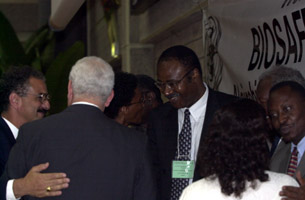
Chair Yang officially adjourned the meeting at 2:30 pm.
|

Subscribe to Linkages Journal for
free
Catch-up on the latest news,
information and analysis from international environment and
development negotiations with Linkages Journal. Each month, Linkages
Journal - the sister publication of Earth Negotiations Bulletin -
updates readers on what's been happening and what to expect in key
negotiations and processes, including those on climate change, forestry, desertification,
biodiversity, wetlands, ozone, chemical management, trade, and
development.
To
take out a free e-mail subscription to Linkages Journal, please choose the
|


